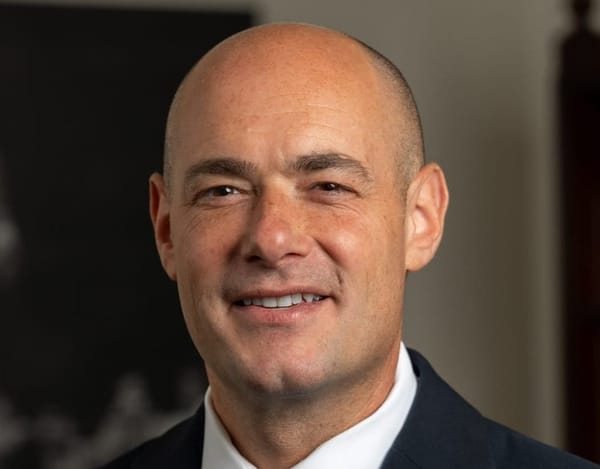12 Days: Pole Attachment Changes in 2023 Set Stage for BEAD Implementation
Chairwoman Jessica Rosenworcel said the FCC's recent move was an effort to ease friction for BEAD deployments.
Jake Neenan

December 22, 2023 – Pole attachments continued to be a hot button issue in 2023 as the $42.5 billion Broadband Equity, Access and Deployment program got closer to breaking ground.
Broadband providers often attach fiber to wood poles owned by utility companies when expanding their infrastructure. Those poles sometimes need to be replaced to accommodate the extra equipment, either because the pole cannot bear additional weight or to comply with zoning laws.
The 12 Days of Broadband 2023 (click to open)
- On the First Day of Broadband, my true love sent to me:
One Artificial General Intelligence - On the Second Day of Broadband, my true love sent to me:
24 Reverse-Preemption Pole Attachment States (2023 edition) - On the Third Day of Broadband, my true love sent to me:
$3.6 Billion Funds Remaining in the Affordable Connectivity Program - On the Fourth Day of Broadband, my true love sent to me:
4.8 Million Challenges to Broadband Coverage Data - On the Fifth Day of Broadband, my true love sent to me:
56 States and Territorial Broadband Offices Implementing BEAD - On the Sixth Day of Broadband, my true love sent to me:
One-hundred-and 66 Billion Dollars of American Semiconductor Investment - On the Seventh Day of Broadband, my true love sent to me:
7 Layers to the Open Systems Interconnection Model and Open Access Networks - On the Eighth Day of Broadband, my true love sent to me:
The Number 8 As a Representation of Balance, Justice and Fairness - On the Ninth Day of Broadband, my true love sent to me:
93 Percent Match of Federal Funds for Enabling Middle Mile Broadband Program - On the Tenth Day of Broadband, my true love sent to me:
Nearly 10 Months Without FCC Spectrum Auction Authority - On the Eleventh Day of Broadband, my true love sent to me:
More Than 11 Years in Lawsuits Over Net Neutrality - On the Twelfth Day of Broadband, my true love sent to me:
12 Year Olds (and Older) Having to Age-Verify on Social Media
The biggest disagreement centers on which party has to pay for those replacements. The Federal Communications Commission has authority under the Communications Act to set the terms of pole attachment deals between telecommunications providers and investor-owned utilities. That doesn’t cover all broadband deployments as some broadband providers are not registered telecom carriers and some poles are publicly owned, not to mention the 24 states with their own laws reverse-preempting the FCC on the issue, but it’s a big enough deal for telecoms and utilities to push the agency to intervene.
The standing policy was to allow pole owners to allocate all replacement costs to an attacher if a replacement was “necessitated solely” by the need to accommodate new equipment. But telecom companies argued they were in practice footing the bill for poles that needed replacing anyway, which utilities disputed. The commission first took comments on changes to the cost sharing regime in March 2022, but entered 2023 without issuing a ruling.
Coalitions continued pressing, with utilities signing a letter in January cautioning against shifting more replacement costs on to them. They said doing so would “cause many utilities to reconsider, for the first time in four decades, whether dropping everything to perform voluntary and premature pole replacements is worth the time, effort and expense.”
Telecom companies fired back in April, writing to the commission that “pole owners have exploited their monopoly power to receive windfalls by pushing the entire cost of pole replacements onto a new user of their pole.”
Action late in 2023
The proceeding sat in limbo for much of 2023, with groups still pushing for FCC action as BEAD money was allocated in June and states got to work drafting their plans for awarding grants under the program.
In a Broadband Breakfast Live Online event in October, utilities said that cost for those replacements should be shouldered by broadband providers. But that’s unfair to providers because pole owners benefit from attachers putting in new poles, countered a broadband industry trade group.
The commission announced in November it would be considering new rules on the issue at its December 13 meeting. The version of those rules that were ultimately approved set up the Rapid Broadband Assessment Team, an agency group that will be responsible for quickly resolving disputes that would otherwise slow down broadband deployment.
FCC Chairwoman Jessica Rosenworcel said the move was an effort to ease potential friction for BEAD deployments. RBAT, as the commission calls it, will screen cases for placement on the FCC’s accelerated docket, meaning they will be fast-tracked for resolution in under 60 days. For instances too complex or novel for the accelerated docket, the group is tasked with working to resolve them through mediation or other means.
The new rules also expand the definition of a “red tagged” pole, the replacement cost of which cannot be allocated entirely to an attacher by FCC rules. The term previously covered poles that failed to meet safety standards and had been placed on a utility’s replacement schedule for any reason other than accommodating new telecom equipment.
Now, only the latter is required to prevent utilities from shifting all replacement costs to attachers, effectively requiring pole owners to pay for some replacement costs more often.
The FCC is still taking comments in the proceeding, this time asking for input on a defined timeline for processing bulk attachment applications and on when telecoms can do their own contracting work to prepare poles for attachments. Those comments are due in February 2024.








Member discussion